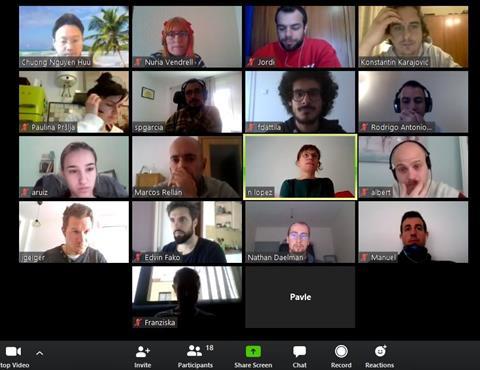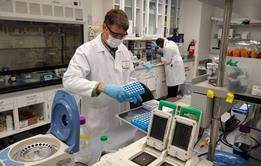The Spanish scientific superstar is at home, but busier than ever trying to get researchers access to Europe’s supercomputers to fight Covid-19

During this difficult time, Chemistry World will be checking in with chemists around the globe to see how they are weathering the Covid-19 pandemic.
The Institute of Chemical Research in Catalonia (ICIQ), Spain, closed in mid-March due to the Covid-19 pandemic. Núria López, a group leader at ICIQ whose research involves computer modelling of materials for catalysis and energy, is working from home. She says the disruption has been manageable for her group because its members can work remotely quite easily.
López’s team comprises roughly 16 researchers, plus about four other administrative support staff and technicians. ‘We are basically interacting with computers doing simulations, so for us it is relatively easily to telework,’ she explains.
Ready to work remotely
López says it was ‘relatively straightforward’ to close her lab because she received a heads-up from Chinese and Italian colleagues. She had therefore been preparing for a closure for more than one week before it happened.
‘Everybody was asked to test all the programmes that we were going to use remotely,’ she recalls. ‘We were communicating regularly with our Chinese colleagues and we were seeing the conditions under which they were working – they told us how they were handling things and warned us that the situation was difficult, and that one had to be prepared.’
The circumstances of her Italian colleagues also served as a catalyst for the early planning. ‘Barcelona is … only about an hour’s flight to Milan, so we were seeing what was going on there and it was very easy to infer that the same situation would come to us in a very short time,’ she says.
Most of the remote systems that López’s team needed to collaborate and conduct their research remotely were already in place, but they tested them to make sure that they could accommodate the anticipated increase in online traffic, and that all the various components and features were working properly.
Life under lockdown
It appears that Spain will remain essentially closed until at least 26 April. ‘We are under a state of alarm with very strong lockdown, so we are only allowed to go out for food or medicines,’ López describes. She expects that her lab might be able to open again in May.
In the meantime, López and her team members keep connected through Zoom and Skype, as well as email. She is also participating in larger meetings for European projects, usually conducted through Microsoft Teams.
In fact, López finds herself working much more since her lab closed. She is involved in the Partnership for Advanced Supercomputing in Europe (Prace), which approves supercomputing hours for researchers throughout Europe. The initiative recently launched an effort to make available all the supercomputers in Europe for research that is relevant to the Covid-19 fight. As the former chair of Prace’s scientific steering committee, López is one of five people who meet virtually every day to go through all of these applications and find reviewers to vet the proposals for supercomputing time.
López has noticed that teleworking naturally creates some inefficiencies. ‘It takes a little bit more time and effort to get things done,’ she says. She estimates that about 85% of her scientific work can be conducted remotely, but only about 30% of the associated administrative tasks are getting done. These include applying for research grants and recruiting staff, as well as submitting and receiving reimbursements for the costs of travel cancelled because of the pandemic.
Team building
López has initiated a weekly meme competition with her research group so that they can bond over shared jokes. In addition, each weekday a different team member recommends a list of activities to the others, which typically involves things like artwork, music, videogames or movies.
She has also organised one or two internal online courses per week that focus on important non-research topics that normally get short shrift. For example, her personal assistant recently gave a primer on English science writing, having become an expert from reading so many research papers in that language.
López, who lives in an apartment in the centre of Barcelona, believes that her team will emerge from this crisis stronger and happier, by being more resilient, collaborative and supportive.
To pass the time and keep her spirits up, she sunbathes on her balcony, talks to her family a lot by Zoom or Skype, watches movies and cooks. She particularly loves baking, but unfortunately baking powder is one of the hardest to come by items in stores these days.
After trekking around Europe for work almost every week for the last two years, López thinks maybe it was about time to stay home. ‘I have been travelling too much, so probably it was good that I stopped and reflected a little bit,’ she says.
Chemists amid coronavirus

How chemists around the world are coping with life and work during the Covid-19 pandemic
- 1
- 2
- 3
- 4
- 5
- 6
 Currently
reading
Currently
reading
Chemists amid coronavirus: Núria López
- 8
- 9
- 10
- 11
- 12
- 13
- 14
- 15
- 16
- 17
- 18
- 19
- 20
- 21
- 22
- 23
- 24
- 25
- 26
- 27
- 28
- 29
- 30
- 31
- 32
- 33
- 34
- 35
- 36
- 37
- 38
- 39
- 40



























































































2 readers' comments